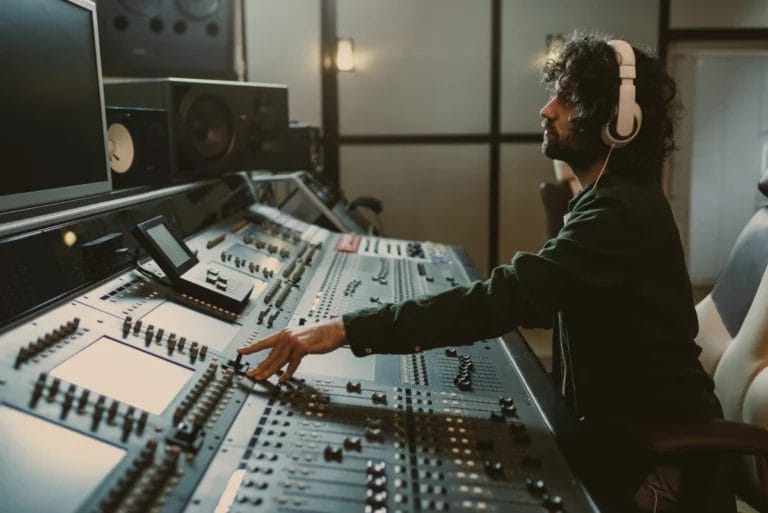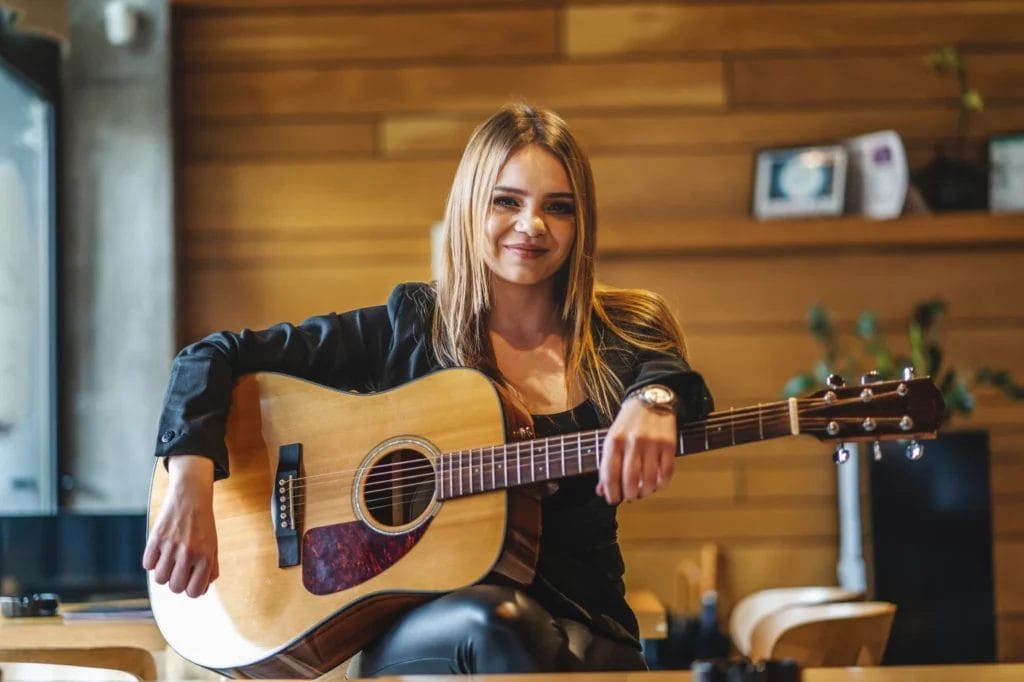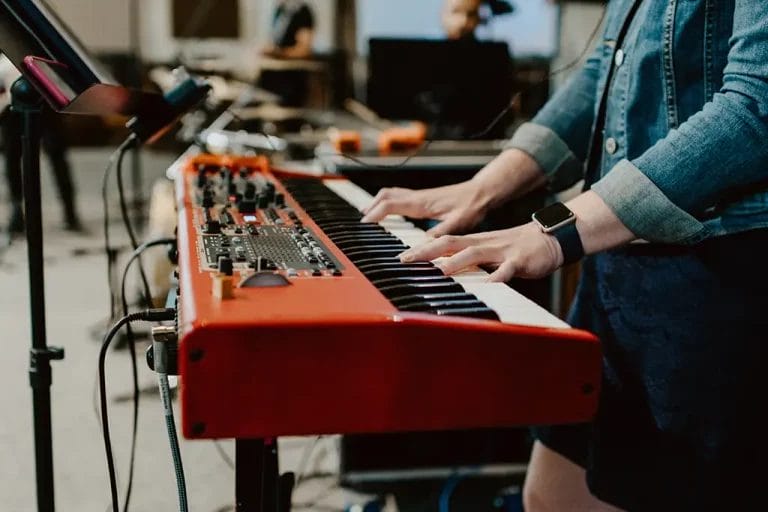Have you ever dreamed of performing on stage in front of crowds? All those piano tutoring sessions, summers at band camp, and middle school orchestra fees your parents paid for played a pivotal role in launching your musical career.
But you may still be uncertain about the type of musician you are and the career path you want. That’s ok.
We’ve compiled a thorough list of nine musician types and informative details about their incomes and markets so you can find perfect harmony between your musical interests and career.
Top Musician Types in the Industry
Whether you’re interested in jamming out with a band or playing solo, there’s a long list of music careers you can choose from. Learn more about these musician types and find one that matches your interests and skills.*

1. Orchestral
An orchestral musician rehearses, performs, and sometimes even records classical music with an entire orchestra. They often have concert hall residencies or go on tour with their organization. Some states even have designated orchestras named after them.
Salary
An orchestra musician’s average salary is $44,855. However, factors affecting your final salary include location, orchestra, placement (first chair, second chair, etc.), the number of concerts you perform, customer demand, and ticket sales.
- Andrews, MD | $57,154
- Nome, AK | $55,643
- Berkeley, CA | $54,923
- Sitka, AK | $54,036
- Claremont, VA | $53,807
High Demand Instruments
Most orchestras feature a variety of instrument types, but the most popular include:
- Strings: violins, cellos, and violas
- Woodwinds: flutes, oboes, saxophones, and bassoons
- Brass: French horns, tubas, and trombones
- Percussion: drums, cymbals, triangles, and tambourines.
Real-World Orchestral Artists or Organizations
Yo-Yo Ma
Colorado Symphony
New York Philharmonic
Philadelphia Orchestra
The Cleveland Orchestra

2. Recording Artist
Recording artists are musicians who record their music in a studio. While bigger artists usually have contracts to record albums and singles, many up-and-comers opt to rent studio space and produce albums independently. In addition to working in the studio, recording artists often go on tour to promote their music.
Not sure how to make the most of a recording session. Check out these tips on nailing recording sessions.
Salary
A recording artist’s average salary is $60,546 — which varies based on location, demand, the type of recording contract you sign, your music popularity, who you know in the business, and the record company you work with.
- Nome, AK | $75,107
- Berkeley, CA | $74,135
- Sitka, AK | $72,939
- Sunnyvale, CA | $72,032
- Menlo Park, CA | $71,347
Breaking Into the Industry
You don’t become a recording artist overnight.
Breaking into the record industry takes time and dedication, like practicing your instrument or training your singing voice. You must network with the right materials, like merch, social media pages, business cards, and flyers.
When you land that contract, you get many perks like earning more revenue for your music, playing in national and international venues, and rubbing elbows with other artists, producers, and engineers.
On the other hand, signing with a big record label has some unique challenges. You may have less creative control over your music since you’ll work with producers and executives. If you’re lucky enough to book a tour, you could be on the road for several months, performing and self-promoting.
Looking for the right place to break into the industry? Check out our best cities for musicians report.
Real-World Recording Artists
- Beyoncé
- Sabrina Carpenter
- Billie Eilish
- Bruno Mars
- Lady Gaga

3. Producer and Beatmaker
Producers and beatmakers ensure songs and albums have the right sound. They’re the ultimate masterminds behind a lot of your favorite music. Though their roles are typically in the background, these maestros of the music studio craft the instrumental backing to the artists’ vocals.
Salary
A music producer’s average salary is $168,964. This value can change based on your location, market demand, how well your beats mesh with artists’ vocal styles, and record label interest.
- Corcoran, CA | $269,339
- Corte Madera, CA | $209,899
- Nome, AK | $209,599
- Cupertino, CA | $208,459
- Mercer Island, WA | $206,935
Be Careful What You Sample
Some producers create unique beats while others use samples. “Sampling” means a beatmaker takes audio from another song — such as vocals, drums, guitars, or other elements — to make new music.
Samples give existing songs new life. However, you must be careful when using music from other artists. If you don’t get permission from an artist, producer, or the artist’s estate to use their songs or beats, you could face copyright lawsuits like:
Real-World Producers and Beatmakers
- Timbaland
- Pharrell Williams
- Tyler, The Creator
- DJ Premier
- Rick Rubin

4. Street Performer aka Busker
Street performers, aka buskers, perform music in the streets for money and to entice pedestrians with their music. Many musicians use busking to gain exposure, practice performing, and earn a few extra bucks.
Learn more about how to launch your busking career.
Salary
A busker’s average salary is $45,133. Usually, you only make what people put in your hat or instrument case — unless a record company or talent agency represents you, or you have a deal with some of the local vendors.
- Green River, WY | $54,094
- Kernville, CA | $52,491
- San Mateo, CA | $52,020
- San Francisco, CA | $51,928
- Sunnyvale, CA | $51,477
Get Permission Before Busking
Some cities have busking rules requiring you to get a (typically affordable) license; others don’t. Research local laws to determine if busking is allowed. It’s better to be safe now than receive a citation or fine for performing illegally.
If you perform near local shops or restaurants, visit the owners beforehand and ask for permission to avoid disturbing their business.
You also need a license if you play copyrighted songs in public to ensure the original artists get their royalties. You can obtain a permit from one of these associations:
Real-World Buskers
- Ren
- Ed Sheeran (Started as a busker)
- The Roots (Started as buskers)
- Janis Joplin (Started as a busker)
- Billy Bragg (Started as a busker)

5. Wedding Musician
Every wedding has two people wholeheartedly committing their love and lives to each other, a big cake, and music. It’s tradition. Your job is to deliver great tunes to the happy newlyweds and be one of the many highlights of their special day.
Salary
The average wedding musician’s salary is $35,750. Your take-home depends on the number of weddings you perform, demand, locations, reputation, and popularity of your music.
- New York City, NY | $39,111
- Los Angeles, CA | $38,521
- Chicago, IL | $36,827
- Austin, TX | $35,435
- Nashville, TN | $34,530
Take Your Performances to Other Events
Since wedding season is the busiest from May to October, you may want to fill the gaps during the slower months by playing at other types of events, such as:
- Bar Mitzvahs/Bat Mitzvahs
- Anniversary parties
- Vow renewal ceremonies
- Fairs/festivals
- School dances
Real-World Wedding Bands
- Moments Notice & Company
- KD & The Painkillers
- June Brothers
- Til Further Notice
- Bread and Butter

6. Gospel Musicians
Gospel musicians and singers use their talents to sing Christian songs that instill hope, enlightenment, and faith in audiences. Some Christian artists reserve their singing for church-based events and services, while others record singles or albums and perform concerts.
Salary
A gospel singer’s average salary is $261,533. Factors that affect this final number include experience, the type of gigs you receive, the recording label you work with, whether you perform solo or in a group, and location.
- Nome, AK | $324,430
- Berkeley, CA | $320,231
- Sitka, AK | $315,063
- San Francisco, CA | $308,131
- Santa Clara, CA | $307,154
Real-World Gospel Artists
- Tamela Mann
- TobyMac
- Kirk Franklin
- Third Day
- James Cleveland

7. Band Musicians (Rock, Punk, Pop, etc.)
Bands range in genres from rock and metal to punk and even jazz. While the vibes may vary, at the core of every band is a shared interest in making music and performing together. From local dive bars to giant stadiums, bands are the lifeblood of musical innovation.
If you’re a band in need of a name, get 10 band name ideas for inspiration.
Salary
The average band salary is $57,114, and you split it with each band member. This salary varies based on your location, experience, how many gigs you have, the merch you sell, and if you get a record deal from a large or small recording label.
- Nome, AK | $70,850
- Berkeley, CA | $69,933
- Sitka, AK | $68,804
- Justin, TX | $67,450
- San Francisco, CA | $67,290
From Garages to Gigs
Bands usually start small in garages or basements to find their name, write some songs, and perfect their sound.
Once you’re ready, you can look for performance opportunities at:
- Open mic nights
- Band festivals
- Small or mid-sized clubs
- Friends’ house parties
- Openers for other bands or artists
You can also promote your band with a website, social media pages, and a Spotify for Artists page.
Real-World Bands
- Paramore
- Maroon 5
- Nickelback
- Alice In Chains
- The Beatles

8. Hip-Hop and Rap Artists
Rappers are artists who express themselves and tell stories through rhyme schemes, wordplay, and other poetic tools. Originating in the South Bronx in the early 1970s, rap and hip-hop have grown in popularity worldwide, serving as an epicenter of creativity and innovation in the music industry.
Salary
A rap artist’s average salary is $112,568. Remember that final salaries vary by location, if you’re on a record label or identify as an independent artist, where you live and perform, and how many gigs you have.
- Nome, AK | $139,641
- Berkeley, CA | $137,833
- Sitka, AK | $135,609
- Brisbane, CA | $135,428
- San Francisco, CA | $132,625
Boost Your Rap Skills
Lyrics and storytelling that resonate with audiences are essential elements of this genre. Many rappers start “underground,” working independently and getting their music out through platforms like YouTube or SoundCloud before getting signed to a major record label.
Some artists build their reputations through freestyle rap battles where two or more artists improvise their lyrics. In fact, many well-known rappers — like Jay-Z and Lil Wayne — choose to freestyle their lyrics all the time.
Here are a few ways to boost your songwriting abilities:
- Take poetry classes to hone your poetry skills, like metaphors, rhymes, and alliteration
- Participate in local open mics to see how crowds resonate with your music
- Battle rap with other rappers to build your freestyling skills
Real-World Hip-Hop Artists and Rappers
- Jay-Z
- Eminem
- Kendrick Lamar
- Doechii
- Awkwafina

9. Jazz Musicians and Singers
Jazz pianist Benny Green best sums up this genre in one quote: “A jazz musician is a juggler who uses harmonies instead of oranges.”
Jazz music typically follows an improvisational style, and is often divided into sub-categories like smooth, cool, string, and Bebop. Jazz musicians usually play or sing in big bands, as solo acts, or start small quartets or quintets.
Salary
A jazz musician’s average salary is $27,000. Factors that affect your paycheck include location, cost of living, customer demand, the type of record label you work with, promotion strategies, tours, and the number of gigs you book.
- New York City, NY | $29,538
- Los Angeles, CA | $29,092
- Philadelphia, PA | $27,245
- Chicago, IL | $26,385
- New Orleans, LA | $25,929
High Demand Instruments
The beauty of jazz is the variety of sounds and styles it embodies. While every ensemble is a little different, the most popular instruments for jazz artists include:
- Saxophones
- Trumpets
- Clarinets
- Pianos
- Double basses
- Electric bass guitars
- Drums
Real-World Jazz Artists
- Charlie Parker
- Miles Davis
- John Coltrane
- Billie Holiday
- Amy Winehouse
Building a Music Career That Works for You
Understanding the different types of musical careers you can pursue is key to finding your place in the music industry.
Are you all about insightful vocals that move hearts, or do you crave the energy of a rock band to get crowds jumping?
Whatever path you choose, here are some ideas to push you in the right direction:
- Education: A higher degree from a university or music conservatory gives you the building blocks of music theory and technical skills. Plus, you can connect with other musicians and professors.
- Mentorships: Take one-on-one courses with skilled musicians and ask them to take you under their wing as your mentor. They can give you personalized coaching and career advice.
- Workshops or short courses: Enroll in summer music workshops or camps to learn in-depth techniques. You can also meet other students and teachers and build your network.
- Beyond performances: A career in the music industry can be more than performing. You can produce or make beats, mentor, teach, manage new artists, or become a music journalist or critic.
- Personal fulfillment or a career: Your musical path can be a hobby or a full-time career. Don’t underestimate the value of making music for yourself.
Check out our list of the latest music trends to boost your music career.
Protect Your Passion
No matter what type of musician you are, it takes thousands of hours of practice, education, and experience to master your craft. In a perfect world, that would be enough to ensure that you have a fruitful career. But that’s not always the case.
You need musician insurance to safeguard your greatest investment: yourself! This coverage can pay for common claims you might face as a professional musician, like accidental property damage to the venues where you perform or an audience member who trips over your mic cord.
When you turn your music into a profession, you take on risk. That’s show business for you. If you want to keep growing and performing, it’s important to limit your risk. An investment in insurance — including protection for your equipment — is one of the best ways to do that.
*Our list consists of data from ZipRecruiter. Although numbers constantly change, these data points were accurate as of May 2025.

FAQs About All Types of Musicians
Do I Need Formal Training to Become a Professional Musician?
You don’t need to have formal training to become a professional musician.
However, education from colleges or universities, workshops, one-on-one sessions, or online courses can teach you music fundamentals, help build industry connections, and provide structure to practice and improve your abilities.
Can I Be More Than One Type of Musician?
Yes, you can be more than one type of musician. Some musicians dabble in different genres and styles. Elton John, Linda Ronstadt, Madonna, Prince, and Taylor Swift are just a few examples of multi-genre artists.
What Kind of Musician Makes the Most Money?
According to ZipRecruiter, gospel musicians make the most money, with an average salary of $261,533. This salary is likely based on location, the amount of merchandise sold, and national and international fan bases.
What’s the Difference Between a Session Musician and a Solo Artist?
The difference is that a session musician is an artist who plays an instrument or provides vocals as “back-up” on another artist’s track, and a solo artist is a musician or singer who works alone, either with a record company or by themselves.





